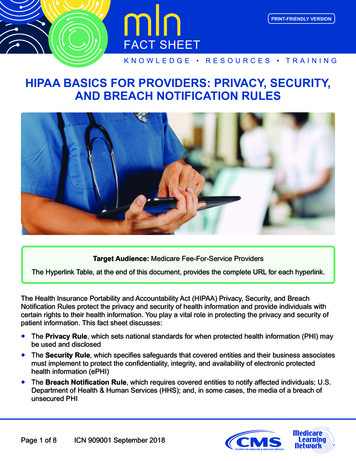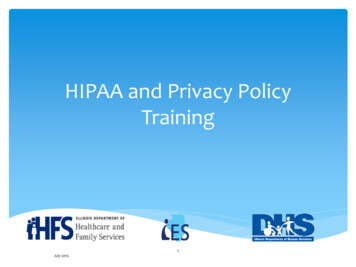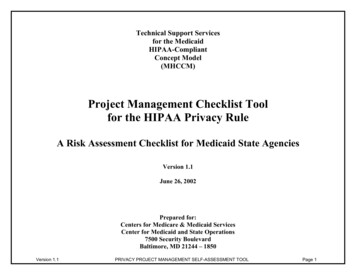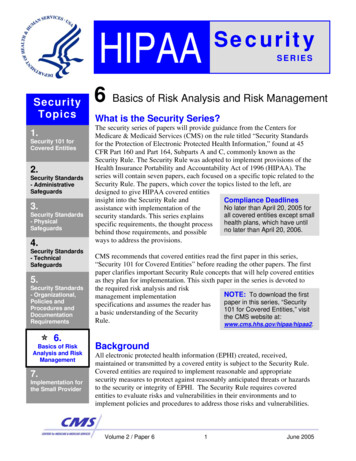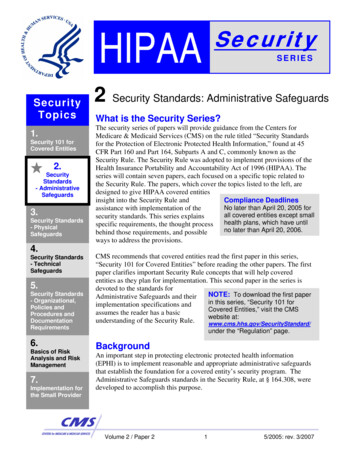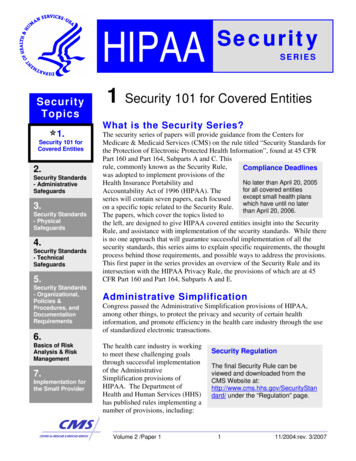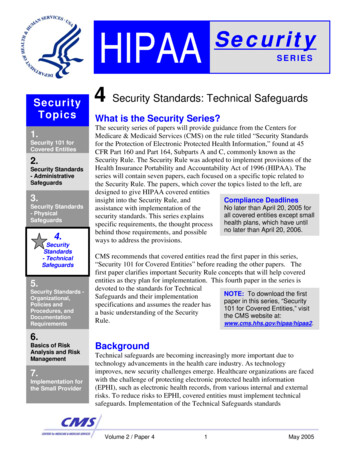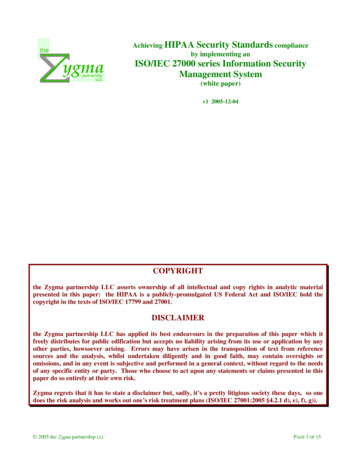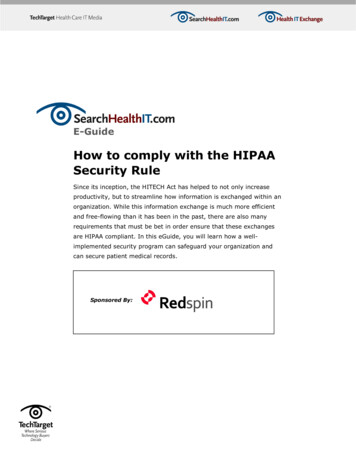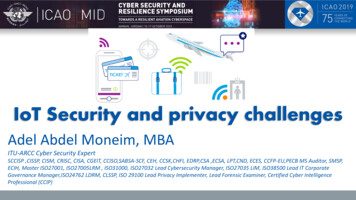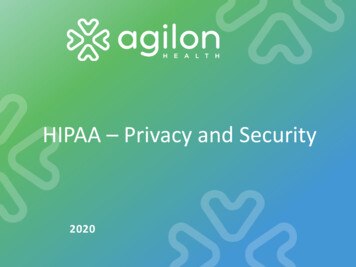
Transcription
HIPAA – Privacy and Security2020
Overview of HIPAA – Privacy and SecurityThe Health Insurance Portability and Accountability Act (HIPAA)Privacy Rule provides federal protections for personal healthinformation held by covered entities and business associates and givespatients an array of rights with respect to that information.The Privacy Rule does permit the disclosure of personal healthinformation needed for patient care and other important purposes.The Security Rule specifies a series of administrative, physical, andtechnical safeguards for covered entities and business associates touse to assure the integrity, confidentiality, and availability of electronicprotected health information.2
3
Privacy4
Privacy Rule PurposeTo protect the privacy of PHI and sets limits and conditions on the usesand disclosures that may be made of such information without patientauthorization.To protect individuals’ medical records and other personal healthinformation and applies to covered entities that conduct certainhealthcare transactions electronically.Gives patients rights over their health information, including rights toexamine and obtain a copy of their health records and to requestcorrections.5
Protected Health Information (PHI)All information that is spoken, written, and/or electronic about amember is confidential and protected.Name/AddressSocial Security Number/Health Insurance Claim NumberDate of BirthEnrollment status/applicationClaimsSatisfaction surveys that may include member dataBilling informationContacts with customer serviceMember appeals/grievancesRemittance advices that contain member dataIllness, treatments, medications, notesMedical Records6
Minimum NecessaryBe prudent and follows this guidance – before looking at or sharing PHI,as yourself:Do I need to know this to complete my job function?Does the other employee need to know this information to completehis/her job function?7
Protection of Health InformationAlways follow these general safeguards:Lock bins, drawers, files, and computers when not in use.Secure work area and desktop when not present.Provide faxes, print-outs, and reports only to an employee whoneeds to know the information.Keep access doors to office buildings locked.Don’t give access to anyone that does not have an access badge.Documents that are no longer needed should be shredded orplaced in secure bins.Keep electronic data/devices secure at all times.Ensure email is secure (encrypted) when transmitting PHI.Do not leave PHI on voicemail or leave as a message to anunauthorized individual.Take care in public settings when speaking with clients on cellphones. Repeating information back aloud to confirm names,address, to other personal information can cause a privacy issueif overheard.8
Privacy and Security – What is their Relationship?Both rules are closely linked:Privacy is the “Who, What, and When,” andSecurity is the “How”Definitions and many administration requirements now aligned withthe Privacy regulations.Privacy covers PHI on paper, in electronic form, and provided orally,while Security covers only e-PHI.9
Breach Notification RuleBreach notification regulations require covered entities to providenotification following a breach of unsecured PHI.Breach – An impermissible use or disclosure under the PrivacyRule that compromises the security or privacy of the PHI such thatthe use or disclosure poses a significant risk of financial,reputational, or other harm to the affected individual.Unsecured PHI – PHI that has been released to individualsthrough the use of a technology or some other methodology thatdoes not incorporate an encryption process.10
Breach of PHI – What You Need to KnowSteps to take for perceived privacy policy or PHI violations:Contact the Chief Compliance Officer immediately.Once its determines a breach has occurred, the Chief ComplianceOfficer will execute the notification requirements for coveredentities.Following a breach of unsecured PHI, covered entities must providenotification of the breach to:Affected individuals,Department of Health and Human Services (DHHS), andThe media, in certain circumstances11
Corrective Actionsagilon health will undertake appropriate corrective actions in responseto potential non-compliance.The elements of the corrective action that address non-compliancecommitted by agilon health employee(s) will be documented, includeramifications should the employee(s) fail to satisfactorily implementthe corrective action.agilon health will enforce effective correction through documenteddisciplinary measures, including employment or contract termination,if warranted.12
Penalties for Non-ComplianceThere are both civil and criminal penalties for non-compliance withPrivacy Standards:Civil PenaltiesMonetary penalties based on the type and severity of theviolation.Criminal charges against individuals and corporations may alsooccur.Criminal PenaltiesFine of up to 50,000 and/or 1 year in prison.Fine of up to 100,000 and/or 5 years in prison if the offense iscommitted under false pretenses.Fine of up to 250,000 and/or 10 years in prison if the offenseis committed with intent to sell, transfer, or use PHI forcommercial advantage, personal gain, or malicious harm.13
Non-Compliance ReportingEmployees are required to, and encouraged to, bring forth informationon suspected or known issues of non-compliance, FWA, or otherviolations of patient or company privacy or confidentiality issues.agilon health’s Code of Conduct clearly states this obligation.agilon health prohibits any form of retaliation or intimidation againstemployees for reporting a compliance concern in good faith or forgood-faith participation in any investigation or other proceedingrelated to such a report.Disciplinary actions that could be imposed for non-compliance or FWAinclude training, verbal or written warnings, reprimands, suspensions,terminations, and/or financial or criminal penalties.14
Non-Retaliationagilon health will not tolerate retaliation or intimidation inany form against an employee who, in good faith, reports apotential issue of non-compliance.Any behavior construed as retaliation by any agilon employeeor provider may lead to disciplinary action, up to andincluding terminationIf you feel you are the victim of retaliation, report to your HRBusiness Partner immediately.15
Whistleblower ProtectionsA whistleblower is a person who exposes information oractivity that is deemed illegal, dishonest, or violatesprofessional or clinical standardsProtected: Persons who report false claims or bring legalactions to recover money paid on false claims are protectedfrom retaliationRewarded: Persons who bring a successful whistleblowerlawsuit receive at least 15 percent, but not more than 30percent, of the money collected.16
Ways to Report Non-ComplianceSuspected non-compliance or FWA can be reported in the followingways:By notifying a supervisor, manager, or directorDirectly to the Chief Compliance OfficerThrough the Compliance secured email box (ComplianceAH@agilonhealth.com)or the Compliance hotline (833-668-8638)Reports made through the compliance can be made confidentially oranonymously.17
The Security Rule specifies a series of administrative, physical, and technical safeguards for covered entities and business associates to use to assure the integrity, confidentiality, and a
